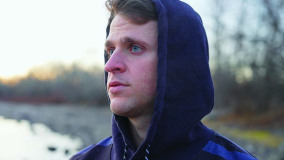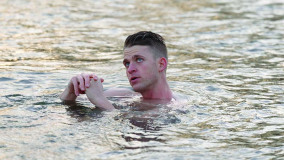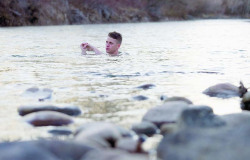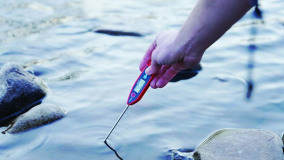No products in the cart.
In Cold Water
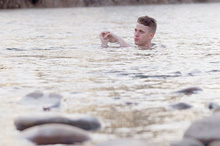
A Chilly Choice
By Lauren Melink
Photos by Benjamin Weaver
I’ve never liked the cold. I have poor circulation in my hands and feet. In the winter, my shoulders always hurt from being clenched against freezing temperatures. One time, I wore eight pairs of socks to go skiing, which, as you may have guessed, backfired because it cut off the blood supply to my feet.
I often wear homemade woolen mittens when I mountain bike—and yes, it looks as ridiculous as you’d imagine.
I love a good fire, space heater, and electric heating pad. When I cook, I warm my hands in the oven or above the stove’s top burners. One Christmas, I received battery-powered heated gloves and the next I received battery-powered heated socks.
As I write, it is seventy-five degrees in my house, eighty-five degrees outside, and I have a blanket on my lap.
I don’t picture Hell as a fiery dungeon. It’s eternity in an icy cavern.
Which is why I am fascinated by people who choose to be cold.
Cold plunging, ice bathing, and cold exposure are types of cryotherapies that involve immersing your body in cold water for a few minutes.
The supposed benefits of what to me would be unimaginable torture include, but are not limited to, reductions in inflammation, anxiety, stress, and muscle soreness, as well as boosts in mood and immune system response, plus improved regulation of blood sugar levels.
Despite my coolness towards…coolness, I am a sucker for wellness trends. And as a television documentary producer, I can explore people and landscapes from a journalistic perspective, so I figured I’d investigate.
Cold plunger Cameron LeBar.
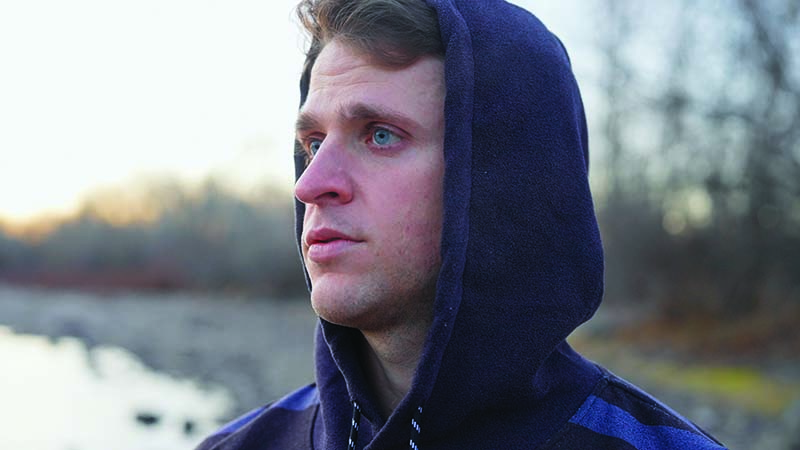
Cameron in the Boise River in March.

In thirty-eight degree water for five minutes.
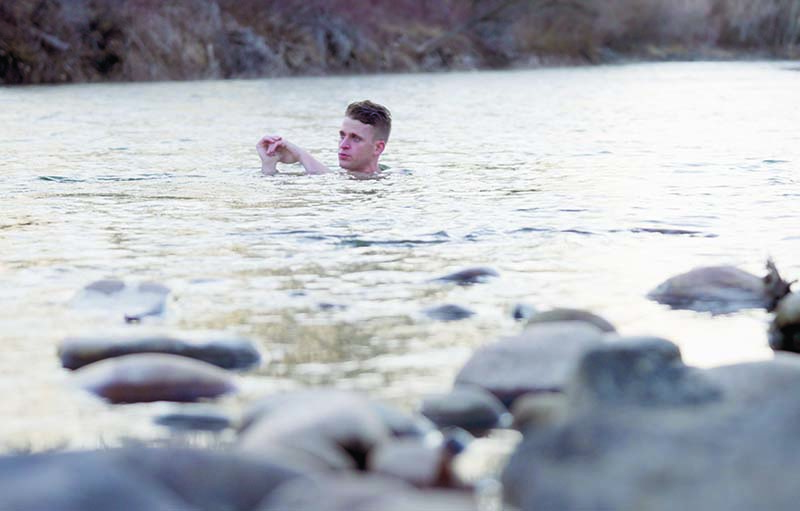
A thermometer check.
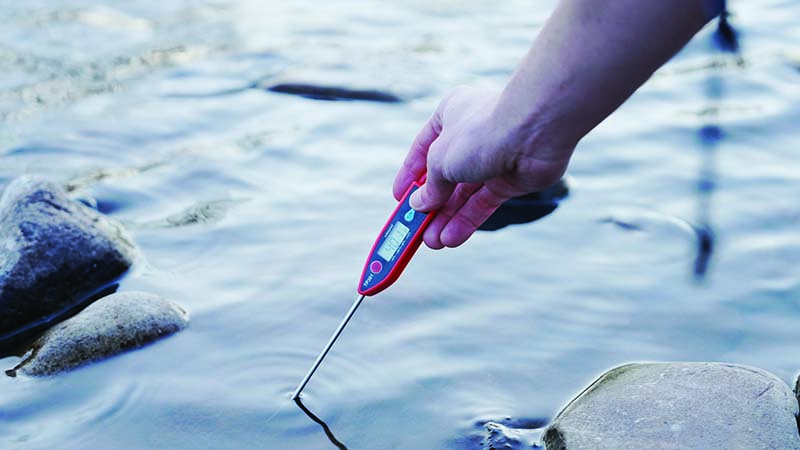
My research quickly led me to Cameron LaBar, a Boise cold plunge enthusiast and Instagram influencer who, when I asked about his celebrity status, bashfully admitted he had started to become recognized around town but said it was weird, because it usually happened at the gym when he was sweaty.
Despite having a gazillion followers, Cameron is down to earth and vulnerable in a way you don’t often see on social media. His posts spare no detail in sharing his life-long struggle with mental health and his decision to begin cold plunging in the Boise River to manage anxiety and depression, and to taper off certain medications.
In some posts, Cameron is an inspirational coach who encourages followers to live the best day of their lives. In others, he quietly admits that he’s been having a tough time.
I’d long been interested in producing a documentary that explored the connection between nature and mental health and the ways in which people consciously and subconsciously seek the outdoors to feel better.
Because Cameron steps out at dawn to watch the sunrise while sitting in a thirty-eight-degree river, surrounded by trees, bushes, rocks, and birds to boost his mood, lower his anxiety, and increase his ability to manage stress, his story seemed ripe for telling. When I asked if he’d be willing to let us tag along with multiple cameras and a notebook full of questions, he agreed.
On a Friday in March, director/videographer/editor Benjamin Weaver and I met Cameron at his riverside apartment at six am. “Pretend we aren’t here,” we always tell people, which I’m sure is nearly impossible to do, unless you’re a reality TV star.
But Cameron was natural, letting us film the most mundane moments of his day, from turning on the light to drinking a glass of water to putting his sandals on. It was when we walked outside that the real challenge began.
The air temperature was twenty-eight degrees, and the water temperature was thirty-eight. To put this in perspective, in water that cold, hypothermia can lead to death in thirty minutes. Because we didn’t want to kill Cameron, we needed to get as many shots as possible in the four to five minutes he’d be able to withstand the cold.
When we finally situated our two video cameras plus one GoPro along with a drone to capture the scene from above, Cameron walked into the Boise River and, with a big exhale, sat down in the water. I shivered and my teeth chattered for him. While the river flowed, Cameron seemed to be working on slowing his breathing: calm inhales and controlled exhales.
I felt like I was spying on someone’s therapy session. In contrast to my newness to cold plunging, Cameron was a pro. He handled the cold water with the grace of a seasoned athlete, well-practiced and peaceful.
Ben and I were not peaceful. We bumbled around, tripping over rocks and tripod legs, trying to get every angle before our time was up. At last, Cameron said he needed to get out. He stood, legs shaking, and stiffly walked to the shore.
Skin red and dripping, hair on end, he threw on his robe and gave us an elated, impromptu interview.
“You’re barefoot, you’re grounding with the earth, you’re getting sunlight. You just feel so good after. It’s like a central nervous system reset. It’s like you wake up from a really good nap.”
According to the internet, he’s not wrong. From the Mayo Clinic to Reddit, scientists, celebrities, journalists, and regular ol’ people rave about the health benefits of cold plunges. Even so, reputable clinics and medical journals are careful to point out that research is in its infancy and more studies are needed to prove a direct connection between cold water immersion and any perceived positive impact.
Some studies say cold plunging undoubtedly has benefits. Others say it cannot be confirmed. Which means it’s left up to us—the human guinea pigs—to see for ourselves.
So I decided to give it a go. My own way: cold plunge lite.
Cameron’s interview had sold me. He did what I wish every interviewee did: he bared his soul, telling me things everyone feels but not everyone says aloud. It’s brave. And that kind of honesty made me think, “This guy must be on to something.”
Cold plunging had changed Cameron’s life and I’d be a robot not to want a little bit of that change in my own.
The next morning, I filled my bathtub with cold water. I don’t have an icemaker, so I grabbed two ice trays and dumped twenty-eight cubes into the water. I grabbed the meat thermometer and stirred the water, thinking it would be close to forty degrees.
Instead, it hovered at fifty-five, unwilling to drop any further. I figured that’d be easy to handle. I stepped in and gasped. As I lowered myself, I reconsidered my life’s choices. My respect for Cameron’s willpower on that twenty-eight-degree morning grew tenfold.
I started the timer on my watch, planning to sit for at least three minutes. After thirty seconds, I was certain fifteen minutes had gone by. After forty-five seconds, I assumed it had been an hour. By the time I hit one minute, I thought if I stayed any longer, I’d turn into an ice cube myself. I got out. One minute at fifty-five degrees.
Cameron did five minutes at thirty-eight degrees. I felt like I had brain freeze in my feet as I shuffled to the shower, but I quickly warmed up and felt good. Not in a life-changing way but in a proud, tried-something-new kind of way.
Maybe I’ll do it again. Maybe I won’t. Either way, I got a lesson in being open, honest, and finding what feels good, no matter what the studies say.
You can watch In Cold Water at idahoptv.org or youtube.com/outdooridaho
This content is available for purchase. Please select from available options.
Purchase Only
Purchase Only

